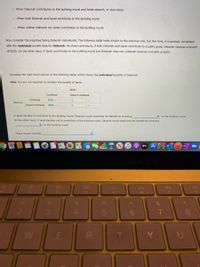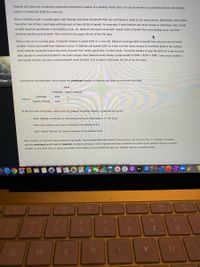
ENGR.ECONOMIC ANALYSIS
14th Edition
ISBN: 9780190931919
Author: NEWNAN
Publisher: Oxford University Press
expand_more
expand_more
format_list_bulleted
Question

Transcribed Image Text:o When Deborah contributes to the building mural and Janet doesn't, or vice versa
O When both Deborah and Janet contribute to the building mural
O When neither Deborah nor Janet contributes to the building mural
Now, consider the incentive facing Deborah individually. The following table looks similar to the previous one, but this time, it is partially completed
with the individual benefit data for Deborah. As shown previously, if both Deborah and Janet contribute to a public good, Deborah receives a benefit
of $320, On the other hand, if Janet contributes to the building mural and Deborah does not, Deborah receives a benefit of $360,
Complete the right-hand column of the following table, which shows the individual benefits of Deborah.
Hint: You are not required to consider the benefit of Janet.
Janet
Contribute
Doesn't contribute
Contribute
$320, -
Deborah
Doesn't contribute
$३60, --
If Janet decides to contribute to the building mural, Deborah would maximize her benefit by choosing
On the other hand, if Janet decides not to contribute to the building mural, Deborah would maximize her benefit by choosing
v to the building mural.
v to the building mural.
These results illustrate
tv
MacBook Ai
DII
F2
F3
F4
F5
F6
F7
%23
%24
3.
4.
W
R
T.
Y
LLI

Transcribed Image Text:Deborah and Janet are considering contributing toward the creation of a building mural. Each can choose whether to contribute $200 to the building
mural or to keep that $200 for a new sult.
Since a bullding mural is a public good, both Deborah and Janet will benefit from any contributions made by the other person. Specifically, every dollar
that either one of them contributes will bring each of them $0.80 of benefit. For example, if both Deborah and Janet choose to contribute, then a total
of $400 would be contributed to the building mural. So, Deborah and Janet would each receive $320 of benefit from the building mural, and their
combined benefit would be $640. This is shown in the upper left cell of the first table.
Since a new suit is a private good, if Deborah chooses to spend $200 on a new suit, Deborah would get $200 of benefit from the new suit and Janet
wouldn't recelve any benefit from Deborah's choice. If Deborah still spends $200 on a new suit and Janet chooses to contribute $200 to the building
mural, Deborah would still receive the $160 of benefit from Janet's generosity. In other words, if Deborah decides to keep the $200 for a new suit and
Janet decides to contribute the $200 to the public project, then Deborah would receive a total benefit of $200 + $160 = $360, Janet would receive a
total benefit of $160, and their combined benefit would be $520. This is shown in the lower left cell of the first table.
Time
Complete the following table, which shows the combined benefits of Deborah and Janet as previously described.
Janet
Contributes Doesn't contribute
Contributes
$640
Deborah
Doesn't contribute
$520 s
Of the four cells of the table, which gives the greatest combined benefits to Deborah and Janet?
When Deborah contributes to the building mural and Janet doesn't, or vice versa
O When both Deborah and Janet contribute to the building mural
O When neither Deborah nor Janet contributes to the building mural
Now, consider the incentive facing Deborah individually. The following table looks similar to the previous one, but this time, it is partially completed
with the individual benefit data for Deborah. As shown previously, if both Deborah and Janet contribute to a public good, Deborah receives a benefit
of $320. On the other hand, if Janet contributes to the building mural and Deborah does not, Deborah receives a benefit of $360.
Complete the right-band.column of the following table which shows the individual benefits of Deborah
stv
MacBook Air
DII
F7
F4
F5
FB
F3
%23
%24
&
3.
6.
Y
W
00
Expert Solution
This question has been solved!
Explore an expertly crafted, step-by-step solution for a thorough understanding of key concepts.
This is a popular solution
Trending nowThis is a popular solution!
Step by stepSolved in 4 steps with 2 images

Knowledge Booster
Learn more about
Need a deep-dive on the concept behind this application? Look no further. Learn more about this topic, economics and related others by exploring similar questions and additional content below.Similar questions
- Two individuals A and B have utility functions defined over two goods, a private good 'x') and a public good, 'F. The utility function of an agent 'i' is defined by ui = 2 log xi + log F where F =FA + FB. Each agent has 200 units of private goods x, as his endowment and 1 unit of private good can be transformed into 1 public good F. Answer the following (a) Find the Nash equilibrium values of FA and FB? (b) What is the Pareto optimal level of F? (c) In what condition the Pareto optimal level of F will not depend on the number of private goods? (d) What would be the consumption of x by each agent if they contribute equally towards the public good (F)? (e) Would it change if an agent had a larger endowment of x to begin with?arrow_forwardKyoko and Rina are considering contributing toward the creation of a public park. Each can choose whether to contribute $300 to the public park or to keep that $300 for a weekend getaway. Since a public park is a public good, both Kyoko and Rina will benefit from any contributions made by the other person. Specifically, every dollar that either one of them contributes will bring each of them $0.90 of benefit. For example, if both Kyoko and Rina choose to contribute, then a total of $600 would be contributed to the public park. So, Kyoko and Rina would each receive $540 of benefit from the public park, and their combined benefit would be $1,080. This is shown in the upper left cell of the first table. Since a weekend getaway is a private good, if Kyoko chooses to spend $300 on a weekend getaway, Kyoko would get $300 of benefit from the weekend getaway and Rina wouldn't receive any benefit from Kyoko's choice. If Kyoko still spends $300 on a weekend getaway and Rina chooses to contribute…arrow_forwardPlease answer everything in the photos.arrow_forward
- Consider the following pure exchange, Edgeworth box economy. There are two consumers, Adam and Mark, and two goods. Adam has an endowment of 7 units of good 1 and 3 units of good 2 (i.e. wadam = (7, 3)), while Mark has an endowment of 3 units of good 1 and 7 units of good2 (wmark$ = (3,7)). The consumers' utility functions are given by: Uadam = Xa1 + Xa2 and Umark = min{xm1, Xm2) where x¡1 is the consumption of good 1 by consumer (i = adam, mark) (a) Find the set of Pareto optimal allocations of this economy (b) Find the Walrasian equilibrium.arrow_forwardYour total benefits from spending time with your spouse are shown in the following table. Hours per Day Total Benefit 0 0 1 20 2 38 3 54 4 68 5 80 6 90 7 98 8 104 Alternatively, you have the option of working as many hours as you want, earning $11 per hour. Assume this is the next best use of your time. Use the marginal principle to find your optimal number of hours to spend with your spouse per day. The optimal amount of time for you to spend with your spouse is hours per day Note:- Do not provide handwritten solution. Maintain accuracy and quality in your answer. Take care of plagiarism. Answer completely. You will get up vote for sure.arrow_forwardTwo countries decide to specialize in producing certain goods to export to other countries, and in return they import different goods from these other countries. The advantage of these exports and imports is: Group of answer choices the country will be able to produce at a point outside your production possibilities frontier. the country will be able to consume at a point outside your production possibilities frontier. the countries will be able to produce and consume at a point outside your production possibilities frontier. the country's production possibilities frontier will shift outward.arrow_forward
- 4.arrow_forwardBrian and Edison are considering contributing toward the creation of a public park. Each can choose whether to contribute $400 to the public park or to keep that $400 for a cell phone. Since a public park is a public good, both Brian and Edison will benefit from any contributions made by the other person. Specifically, every dollar that either one of them contributes will bring each of them $0.80 of benefit. For example, if both Brian and Edison choose to contribute, then a total of $800 would be contributed to the public park. So, Brian and Edison would each receive $640 of benefit from the public park, and their combined benefit would be $1,280. This is shown in the upper left cell of the first table. Since a cell phone is a private good, if Brian chooses to spend $400 on a cell phone, Brian would get $400 of benefit from the cell phone and Edison wouldn't receive any benefit from Brian's choice. If Brian still spends $400 on a cell phone and Edison chooses to contribute $400 to the…arrow_forward“Using efficiency as a criterion biases the analysis in favor of the status quo, since any change is certain to harm someone.” Discussarrow_forward
arrow_back_ios
arrow_forward_ios
Recommended textbooks for you

 Principles of Economics (12th Edition)EconomicsISBN:9780134078779Author:Karl E. Case, Ray C. Fair, Sharon E. OsterPublisher:PEARSON
Principles of Economics (12th Edition)EconomicsISBN:9780134078779Author:Karl E. Case, Ray C. Fair, Sharon E. OsterPublisher:PEARSON Engineering Economy (17th Edition)EconomicsISBN:9780134870069Author:William G. Sullivan, Elin M. Wicks, C. Patrick KoellingPublisher:PEARSON
Engineering Economy (17th Edition)EconomicsISBN:9780134870069Author:William G. Sullivan, Elin M. Wicks, C. Patrick KoellingPublisher:PEARSON Principles of Economics (MindTap Course List)EconomicsISBN:9781305585126Author:N. Gregory MankiwPublisher:Cengage Learning
Principles of Economics (MindTap Course List)EconomicsISBN:9781305585126Author:N. Gregory MankiwPublisher:Cengage Learning Managerial Economics: A Problem Solving ApproachEconomicsISBN:9781337106665Author:Luke M. Froeb, Brian T. McCann, Michael R. Ward, Mike ShorPublisher:Cengage Learning
Managerial Economics: A Problem Solving ApproachEconomicsISBN:9781337106665Author:Luke M. Froeb, Brian T. McCann, Michael R. Ward, Mike ShorPublisher:Cengage Learning Managerial Economics & Business Strategy (Mcgraw-...EconomicsISBN:9781259290619Author:Michael Baye, Jeff PrincePublisher:McGraw-Hill Education
Managerial Economics & Business Strategy (Mcgraw-...EconomicsISBN:9781259290619Author:Michael Baye, Jeff PrincePublisher:McGraw-Hill Education


Principles of Economics (12th Edition)
Economics
ISBN:9780134078779
Author:Karl E. Case, Ray C. Fair, Sharon E. Oster
Publisher:PEARSON

Engineering Economy (17th Edition)
Economics
ISBN:9780134870069
Author:William G. Sullivan, Elin M. Wicks, C. Patrick Koelling
Publisher:PEARSON

Principles of Economics (MindTap Course List)
Economics
ISBN:9781305585126
Author:N. Gregory Mankiw
Publisher:Cengage Learning

Managerial Economics: A Problem Solving Approach
Economics
ISBN:9781337106665
Author:Luke M. Froeb, Brian T. McCann, Michael R. Ward, Mike Shor
Publisher:Cengage Learning

Managerial Economics & Business Strategy (Mcgraw-...
Economics
ISBN:9781259290619
Author:Michael Baye, Jeff Prince
Publisher:McGraw-Hill Education